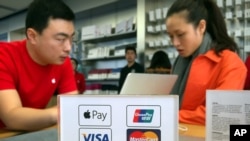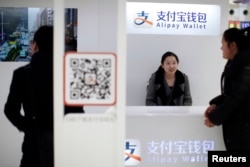Apple Pay, the mobile payment system of Apple Inc., has entered the market in China, its first foray in Asia.
Apple will participate in the Chinese market in collaboration with UnionPay, a credit and debit card transaction service backed by 19 local banks.
The deal is unique because it will enable Apple to become a major player in China’s massive mobile payment market and challenge two major local brands, Alipay of Alibaba and WeChat Wallet, a social media platform owned by Tencent.
Even more than Apple, China’s state-owned banks stand to gain the most out of the new deal.
Payment systems
The country’s national banks, including Industrial Bank of China and Bank of China, were bearing the brunt of the fast expanding payment systems Alipay and WeChat, as millions of Chinese preferred to use these platforms instead of using bank cards.
“This is a good way for the government to save the national banks,” said Chen Lin, assistant professor of marketing at the China Europe International Business School in Shanghai. “The national banks are worried because Alibaba and WeChat were ambitiously entering the financial market. They are now fighting back with Apple Pay.”
Collaborating with Apple Pay will also help Chinese banks expand their footprint in the global market, Chen pointed out.
The government’s decision to open the doors for Apple Pay has also caused some surprise because, according to state media reports last year, the Communist Party asked government officials not to use iPhones. The latest iPhone 6 and more advanced models are required to access Apple Pay.
Encryption concerns
Apple Pay’s entry into the Chinese market also comes at a time when the company is resisting efforts by U.S. government investigators, who are seeking the global tech giant’s help in breaking its iPhone encryption in the investigation into a terror attack in December in San Bernardino, California.
Chinese authorities are said to be watching how Apple fares in its fight against the U.S. government.
Last year, state media in China reported that tech giant Apple had become the first foreign company to agree to Internet security checks.
“If Apple releases information to the U.S. government, the Chinese government is going to be very worried, and this might affect Apple’s long-term prospects in China,” Chen said.
But, she added, “the real question is how Apple would respond if the Chinese government asks for similar information?”
Some analysts said Apple may have been thinking about upsetting China when it objected to efforts by the U.S. government to look into its software.
“Before the deal, China must have sought assurances that Apple’s software is secure, strong enough to protect information about local transactions,” Ernie Diaz, consultant with China Digital Review said. “This could be part of the reason why Apple is opposing the U.S. government’s attempts to access its software."






